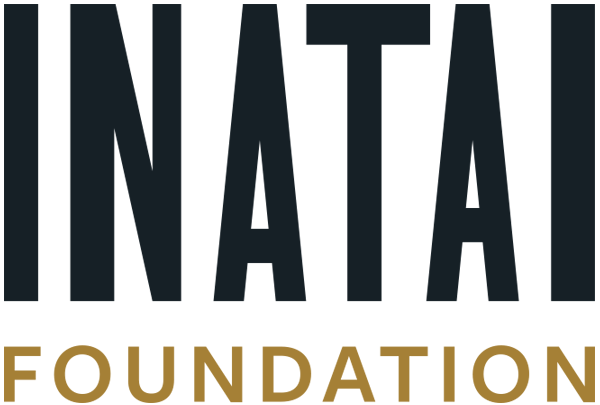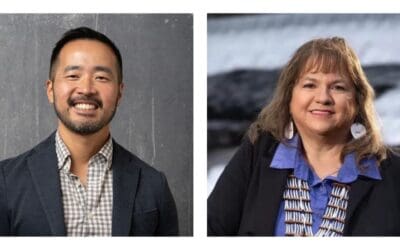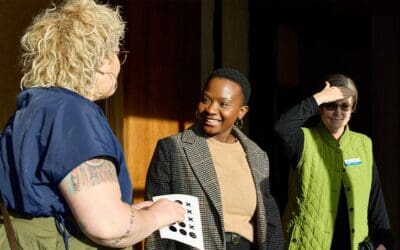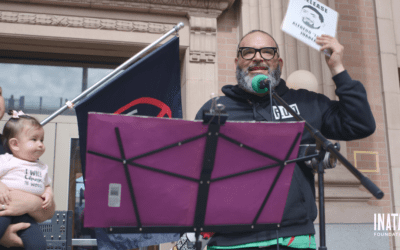Until Feb. 1, 2023, we were Group Health Foundation. This post was written under our former identity. To learn more about our new name, read our announcement here.
In response to the COVID-19 pandemic, Group Health Foundation created the Equitable Response and Recovery Fund to support organizations directly serving and representing Washington communities who are most vulnerable during this outbreak. We specifically funded organizations that are deeply engaged with people at risk of social isolation; people who are out of work or cannot take time off to care for themselves or loved ones; immigrants and refugees; people with disabilities or who are immunosuppressed; Black, Indigenous, and people of color; and communities who need culturally specific or non-English information to prevent spread.
We invited grantees to tell us their concerns and needs. Even though our questions were designed to better understand grantees’ challenges, we heard many stories of strength and of organizations designing creative solutions to meet immediate needs. We heard from a food pantry that quickly adapted to physical distancing guidelines in order to continue serving the more than 1,000 people who rely on them. We learned about a program that printed education packets and distributed them via a “drive through” while schools are closed. We heard a story about a community leader coaching local government on policy measures to protect their communities from the outbreak.
It was clear through these conversations that we must continue to trust the leadership of community-embedded organizations. Many grantees saw the challenges coming early on, and began to act before the pandemic was officially declared in the middle of March. This outbreak only compounds the very real inequities many communities experience every day. As one grantee described it: “If you take the coronavirus out of the situation, this is what our families face day to day: They get laid off, their gas gets shut off, they can’t buy food, they get evicted. The crisis that our families face every day are being spread out to everyone, and people don’t know how to respond. If it’s not your day to day, you are right to panic—that’s what our families have learned to live with.”
“The crisis that our families face every day are being spread out to everyone, and people don’t know how to respond.”
Group Health Foundation is dedicated to documenting and sharing what we are learning as we all work to figure out our best roles during this time of uncertainty. These early insights are from 40 of the more than 75 Equitable Response and Recovery grantees to date.
Grantees were quickly responding to a wide range of immediate needs. The most commonly cited were childcare, food, and cash assistance, though many were working to address other needs. As one grantee said: “We are seeing a crisis at its core. The pandemic is very clearly pointing to huge holes in our social fabric in terms of economic safety nets.”
- Overall, grantees were seeing a high need for resources to make up for the lack of public safety nets, particularly for people with disabilities, undocumented individuals, community elders, and families experiencing housing instability. Grantees were also deeply concerned for the economic well-being of those they serve, many of whom are rideshare drivers or employed by restaurants, hotels, or airlines and airports—industries that have all dramatically slowed down because of the pandemic.
- As places with public restrooms such as libraries and cafes were closing, a direct service provider for people experiencing homelessness was worried about availability. They were looking into providing portable toilets near encampments and parks.
- A community health center led by and for Native people needed more COVID-19 testing kits. They said their Native community members distrusted the broader health industry and relied on their center for care. At the time that we spoke to the center, they only had three kits left.
- A few nonprofits described challenges of ensuring communities are food secure. One noted a noticeable decline of elders visiting their food banks, likely out of fear of becoming ill. Another cited a sudden drop in food donations due to hoarding at grocery stores. A third was working to overcome the cost and logistical challenges of delivering food to people who live in rural areas or who do not have the means to travel to the nonprofit’s food bank.
“The pandemic is very clearly pointing to huge holes in our social fabric in terms of economic safety nets.”
- Technology access was another need. As schools closed, programs were working to get families and children internet service and computers for online learning. An organization for people with disabilities was working to fast-track the use of a federal program to get their clients smart phones at no cost so they could stay connected and minimize social isolation.
- Direct service providers were thinking about the pandemic’s near-term ripple effects. One is anticipating that social isolation will lead to a greater need in services for those experiencing substance abuse, domestic violence, and mental health disenfranchisement. Another is looking ahead to be prepared to serve people facing evictions, foreclosures, and job loss.
- Other grantees have begun advocating for short-term fixes, including passing local ordinances and emergency measures to stop utility shutoffs, evictions, and foreclosures.
Organizations were paying close attention to acts of anti-Asian racism and fearing its rise. Reprehensible rhetoric, irresponsible news reporting, and widespread misinformation about COVID-19 has led to an increase in anti-Chinese and anti-Asian behavior in all corners of Washington.
- An Asian-led organization said this pandemic is presenting two compounding issues: adequately serving the medical needs of their largely Asian patient base while advocating for the humanity of people of Asian descent. “The balancing act as an organization has been challenging,” the organization said, “especially when coupled with the fact our operations have been substantially reduced.”
- A grantee was deeply concerned about how this racialized outbreak would worsen the panic and fear that had already surfaced: “Civility might go out the window and people will do things that are irrational, racist, and dangerous. We have to reinforce messaging that this disease does not discriminate, and it is impacting everyone.”
- Another grantee described early cases in which students of Asian descent were being harassed and expelled because they were wearing medical masks, leading others—including educators—to conclude that the students had COVID-19. “When in fact, in many Asian cultures, wearing the mask as a sign of respect to others,” the grantee said. “We are working with the school district to inform them it’s part of the cultural response.”
“We have to reinforce messaging that this disease does not discriminate, and it is impacting everyone.”
As nonprofits are taking care of communities, they are working to take care of their own teams as well. Many grantees were striving to find a balance between ensuring the health and financial security of their staff while continuing to serve others.
- A few community-based organizations were working to keep employees paid as so many were staying home because of social distancing recommendations. They worry some of their staff are on the verge of homelessness.
- One clinic serving the Native community was in low supply of personal protective equipment for their staff, which is needed while conducting COVID-19 testing.
- A grantee who works with people-of-color-led community organizations is concerned that in response to the pandemic, nonprofit employees are working more hours than they are being paid. “We are worried about the burden staff will put on themselves,” the grantee said. “We believe very strongly people should do the work and we want people from community to do the work. And they should be compensated to do it.”
- With this typically being fundraising season for nonprofits, grantees are taking a financial hit as they cancel plans because of the pandemic. One said by canceling their annual gala, they are losing $1 million in unrestricted funds for uninsured patients.
- A few grantees running food pantries are concerned for their older volunteer base, who would be more likely to become ill from COVID-19.
Organizations still have long-term work in mind while responding to short-term needs of their communities. As the 2020 census count and presidential election cycle are under way, grantees are working to balance immediate needs of their communities while continuing longer term work for systems change.
- A community organization led by and serving the Latinx community was concerned about losing significant ground in their census work because they are no longer able to hold events in public spaces.
- The federal government’s public charge rule, which counts public services used by people applying for U.S. visas against them, is posing another challenge during the pandemic. COVID-19 testing is now exempt under this rule, but many immigrant-rights nonprofits—some of which were organizing against the rule—do not trust that the government will keep its word and were grappling with what to tell their communities.
- One grantee noted: “For this to blow up in a moment when we’re trying to focus on long-term advocacy work in an election year is a huge barrier. These events can cause multigenerational harm. I’m scared of the hecticness of the situation.”
Group Health Foundation is grateful to grantees who spent time telling us their concerns as they work to serve communities in response to the pandemic. We will continue to share more about what we learn as COVID-19 pandemic response and recovery continues.



